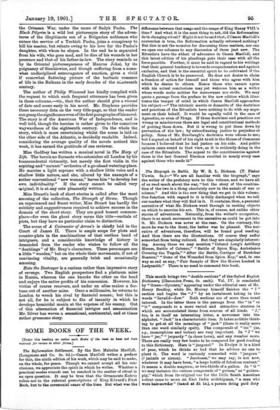SOME BOOKS OF THE WEEK.
rum., this heading we notice such Books of the wok as hove not been reserved for review in other firm.] The Reformation Settlement. By the Rev. Malcolm MacColl. (Longmans and Co. 3s. 6d.)—Canon MacColl writes a preface for this, the ninth edition of his work, which may be said to make, on the whole, for peace. Though we cannot accept all his con- clusions, we appreciate the spirit in which he writes. Whether a practical modes vivendi can be reached in the matter of ritual is an open question. It may be true that the Ornaments Rubric refers not to the rubrical prescriptions of King Edward's First Book, but to the ceremonial usaze of the time. But what was the difference between that usage and the usage of King Henry VIII.'s time ? And what, it is the next thing to ask, did the Reformation do in changing ritual? blight it not be said that, if Canon MacColl's contention is true, the Reformation actually reformed nothing ? But this is not the occasion for discussing these matters, nor can we open our columns to any discussion of them just new. The Ritualists have the ablest of advocates in Canon MacColl, and this latest edition of his pleadings pats their case with all the force possible. Further, it must be said in regard to his writings that their general tendency is towards comprehension and against exclusion, and that is the essential spirit to be cultivated if the English Church is to be preserved. He does not desire to claim a freedom of action for himself and those who agree with him which he denies to others. Hence those who cannot agree with his actual conclusions may yet welcome him as a writer whose words make neither for narrowness nor strife. We may quote a passage from the preface to the new edition which illus- trates the temper of mind in which Canon MacColl approaches his subject :—" The intrinsic merits or demerits of the doctrines and practices of the Ritualists have nothing to do with my argu- ment on their behalf. It would be equally valid in the case of Agnostics, or even of Thugs. If these doctrines and practices are wrong or mischievous there are legal and constitutional methods of putting them down. But it is wrong to put them down by perversion of the law; by subordinating justice to prejudice or policy. Some of Mr. Bradlaugh's doctrines were odious to me ; but I argued on behalf of his right to it in the House of Commons because I believed that he had justice on his side. And public opinion came round to that view, as it is evidently doing in the case of the Ritualists. The appeal to the constituencies against them in the last General Election recoiled in nearly every case against those who made it."






































 Previous page
Previous page